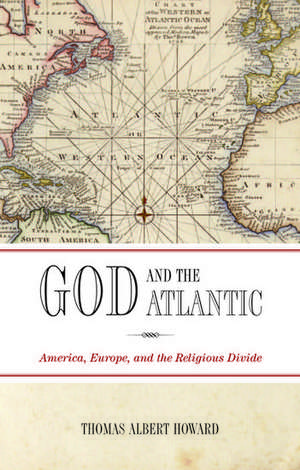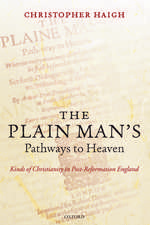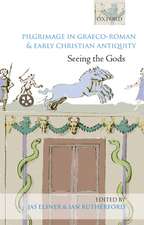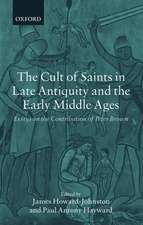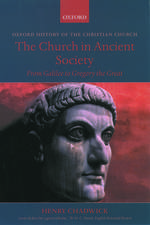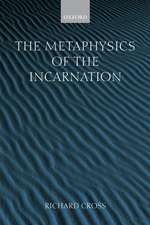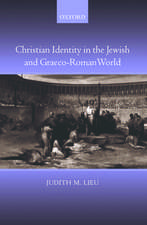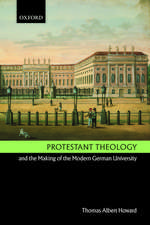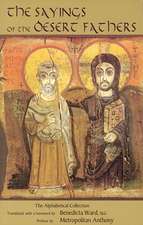God and the Atlantic: America, Europe, and the Religious Divide
Autor Thomas Albert Howarden Limba Engleză Paperback – 17 ian 2013
| Toate formatele și edițiile | Preț | Express |
|---|---|---|
| Paperback (1) | 224.54 lei 31-37 zile | |
| OUP OXFORD – 17 ian 2013 | 224.54 lei 31-37 zile | |
| Hardback (1) | 317.23 lei 31-37 zile | |
| OUP OXFORD – 20 ian 2011 | 317.23 lei 31-37 zile |
Preț: 224.54 lei
Preț vechi: 244.69 lei
-8% Nou
Puncte Express: 337
Preț estimativ în valută:
42.97€ • 44.70$ • 35.48£
42.97€ • 44.70$ • 35.48£
Carte tipărită la comandă
Livrare economică 04-10 aprilie
Preluare comenzi: 021 569.72.76
Specificații
ISBN-13: 9780199671304
ISBN-10: 0199671303
Pagini: 272
Dimensiuni: 144 x 215 x 14 mm
Greutate: 0.34 kg
Editura: OUP OXFORD
Colecția OUP Oxford
Locul publicării:Oxford, United Kingdom
ISBN-10: 0199671303
Pagini: 272
Dimensiuni: 144 x 215 x 14 mm
Greutate: 0.34 kg
Editura: OUP OXFORD
Colecția OUP Oxford
Locul publicării:Oxford, United Kingdom
Recenzii
beautifully written, clearly structured, and argued and it contains a mine of material
Howard has written a remarkable essay in the history of ideas. ... an original contribution, with implications far beyond its original focus for the history and theory of secularization.
[an] immensely thoughtful and useful book ... engagingly written in a lucid and accessible style, for which the author should be congratulated. It valuably moves beyond many generations of thought that have eclipsed America from conventional religious history.
The author expertly demonstrates that Europeans assessment of American religion is not simply negative ... This book is valuable for scholars interested in the intellectual history of the embattled but remarkably resilient secularization thesis.
The causes of the religious divide between Europe and America are hotly disputed among social scientists and contemporary historians. By carefully examining European views of America since the late eighteenth century, Thomas Albert Howard is the first scholar to give historical depth to this debate. Everyone interested to find a way through the labyrinth of transatlantic comparisons and prejudice is well advised to read this book.
This is an excellent, thoughtful, and balanced book. As a historical study with contemporary relevance, it is tightly focused, but gracefully written, with a nice balance struck between theoretical analysis and expository narrative. Howard's ability to navigate the complex political-religious histories of both Europe and the United States gives this book a truly transatlantic perspective.
God and the Atlantic is not only a well-researched and wide-ranging study, it is also a timely book that holds out the promise of helping Americans and Europeans understand each other better. It is illuminating to discover how certain contemporary reactions to apparently new developments are actually based on assumptions with deep historical roots. This book deserves to be read well beyond the scholarly world.
For breadth of research, depth of historical insight, and timeliness of publication, God and the Atlantic is an unusually fine work. Its careful cataloguing of European responses to religion in the United States shows that perspectives from the conservative Right and radical Left share a common rigidity and even sometimes nearly identical judgments. By contrast, European savants who traveled extensively in the United States have sometimes seen things more clearly, and with more nuance, than even America's homegrown observers. The book is a pathbreaking exploration.
God and the Atlantic provides an overview with impressive sweep, and it gives a vivid account of a virulent, persistent and consistent strain of European anti-Americanism. It is worth reading.
Howard has written a remarkable essay in the history of ideas. ... an original contribution, with implications far beyond its original focus for the history and theory of secularization.
[an] immensely thoughtful and useful book ... engagingly written in a lucid and accessible style, for which the author should be congratulated. It valuably moves beyond many generations of thought that have eclipsed America from conventional religious history.
The author expertly demonstrates that Europeans assessment of American religion is not simply negative ... This book is valuable for scholars interested in the intellectual history of the embattled but remarkably resilient secularization thesis.
The causes of the religious divide between Europe and America are hotly disputed among social scientists and contemporary historians. By carefully examining European views of America since the late eighteenth century, Thomas Albert Howard is the first scholar to give historical depth to this debate. Everyone interested to find a way through the labyrinth of transatlantic comparisons and prejudice is well advised to read this book.
This is an excellent, thoughtful, and balanced book. As a historical study with contemporary relevance, it is tightly focused, but gracefully written, with a nice balance struck between theoretical analysis and expository narrative. Howard's ability to navigate the complex political-religious histories of both Europe and the United States gives this book a truly transatlantic perspective.
God and the Atlantic is not only a well-researched and wide-ranging study, it is also a timely book that holds out the promise of helping Americans and Europeans understand each other better. It is illuminating to discover how certain contemporary reactions to apparently new developments are actually based on assumptions with deep historical roots. This book deserves to be read well beyond the scholarly world.
For breadth of research, depth of historical insight, and timeliness of publication, God and the Atlantic is an unusually fine work. Its careful cataloguing of European responses to religion in the United States shows that perspectives from the conservative Right and radical Left share a common rigidity and even sometimes nearly identical judgments. By contrast, European savants who traveled extensively in the United States have sometimes seen things more clearly, and with more nuance, than even America's homegrown observers. The book is a pathbreaking exploration.
God and the Atlantic provides an overview with impressive sweep, and it gives a vivid account of a virulent, persistent and consistent strain of European anti-Americanism. It is worth reading.
Notă biografică
Thomas Albert Howard currently holds the Stephen Phillips Chair in history and is director of the Jerusalem & Athens Forum at Gordon College in Wenham, Massachusettes. He is the author of Religion and the Rise of Historicism and Protestant Theology and the Making of the Modern German University, winner of the Lilly Fellows Program Book Award for 2007. He is also the editor of The Future of Christian Learning: An Evangelical and Catholic Dialogue by Mark Noll and James Turner.
